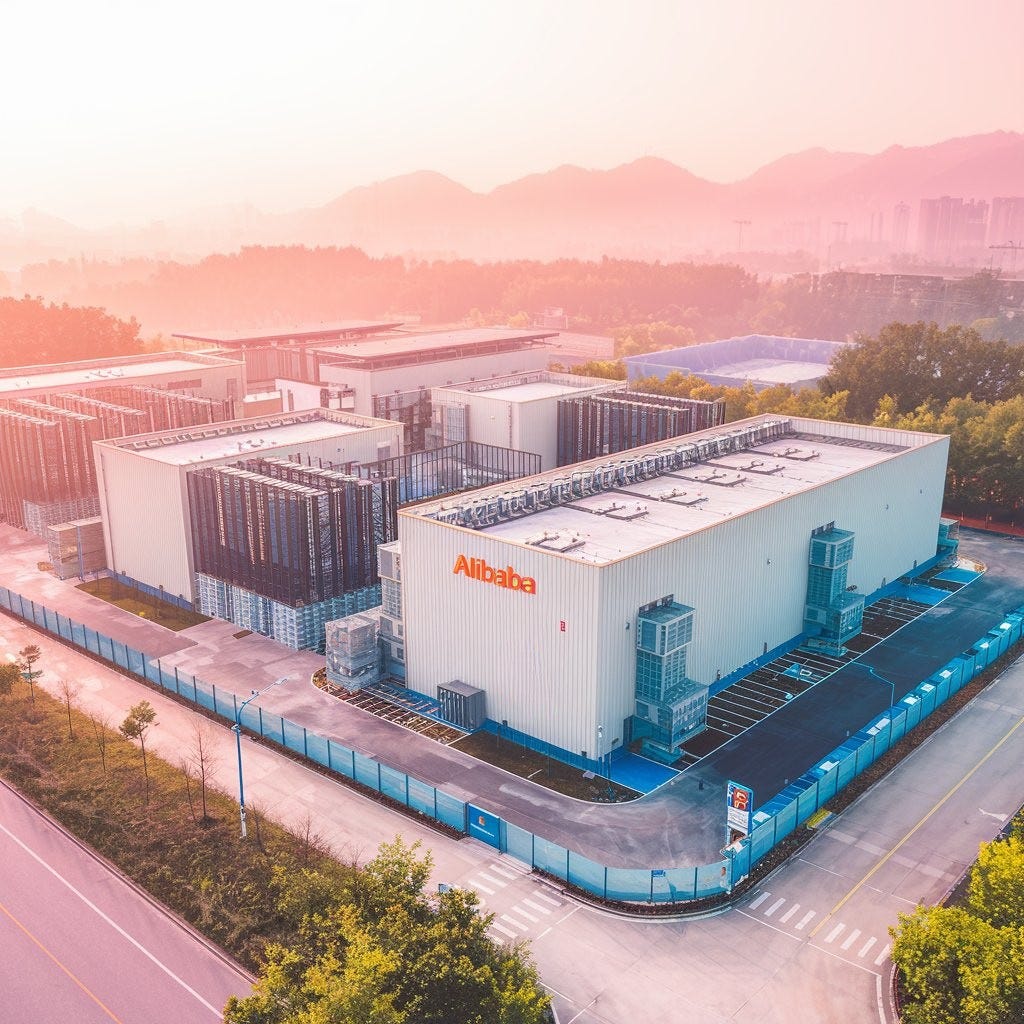Alibaba’s $52.7 Billion Cloud Gambit: Why China's Largest AI Infrastructure Bet Is a Global Power Play
Cloud infrastructure is no longer just about uptime and latency—it’s about geopolitics, national resilience, and global economic positioning. And Alibaba Cloud is leading China’s countermove.
Welcome to Global Data Center Hub. Join 1000+ investors, operators, and innovators reading to stay ahead of the latest trends in the data center sector in developed and emerging markets globally.
The Headline Move
Alibaba Cloud has reaffirmed a staggering 380 billion yuan ($52.7 billion) commitment over the next three years to build global infrastructure for artificial intelligence and cloud computing.
This is the largest private investment in AI and cloud infrastructure in China’s history, outpacing what Alibaba spent in the entire last decade.
The mission?
Build a unified global cloud network
Deliver consistent, high-performance AI services to Chinese and international enterprises
Bypass geopolitical chokepoints that threaten China’s tech expansion
It’s not just about scale. It’s about strategic sovereignty in the AI era.
The Strategy Behind the Spend
Alibaba’s playbook covers three high-impact areas:
Global Cloud & AI Infrastructure
Expanding physical data center presence in Asia, LATAM, the Middle East, Europe, and North America.Advanced R&D
Massive reinvestment into developing proprietary foundation models—like Qwen2.5-Max—positioning Alibaba as a global AI model competitor.AI-Led Transformation
Applying AI internally across every business unit, from logistics to commerce to customer experience.
CEO Eddie Wu called AGI a "once-in-a-generation" opportunity. But in the near-term, Alibaba's moves are shaped by realpolitik: expanding global presence while maintaining domestic dominance amid U.S. tech restrictions.
Why It’s Happening Now
Several urgent dynamics are converging:
U.S. export controls are tightening. In April 2025, Nvidia’s downgraded H20 chips were banned from sale to China. That killed $15 billion in expected sales and forced Chinese firms to rethink their compute strategy.
AI demand in China is exploding. Alibaba reported triple-digit growth in AI product revenue for the 7th straight quarter, with over 18% growth in its cloud segment.
Domestic competition is fierce. ByteDance plans to spend $21B+ on data center infrastructure in 2025. Tencent tripled CapEx in 2024 and is continuing at “low teens” percentage of revenue in 2025. The cloud wars are local and global.
Political alignment is back. In March 2025, President Xi met with Jack Ma and other tech titans, reassuring them that the private sector remains central to national development.
Taken together, these forces create a window of opportunity—and necessity—for Alibaba to act boldly.
The Global Expansion Thesis
Alibaba’s global cloud footprint already spans 87 availability zones across 29 regions.
But that’s just the beginning.
The strategy is to build “proximity power”—placing high-performance infrastructure closer to end-users in growth markets like:
Southeast Asia (Thailand, Malaysia, Indonesia)
Middle East (UAE, Saudi Arabia)
Latin America (Mexico, Brazil)
Europe (Germany, France, UK)
The goal is to offer enterprise-grade AI and cloud services outside of China’s borders—especially in regions that are less aligned with Western export controls.
By doing so, Alibaba enables:
Chinese firms to operate globally without fear of chip access disruptions
Multinational firms in neutral or BRICS-aligned countries to opt into a non-Western cloud alternative
A long-term hedge against Western tech bifurcation
In effect, Alibaba is building a “BRICS+ Cloud” network to rival the U.S.-led hyperscaler cloud stack.
Price Wars, Performance, and Profit Pressure
Alibaba’s scale-up isn’t happening in a vacuum. It’s part of a broader Chinese cloud market shake-up.
In Q2 2025, Alibaba slashed prices on its Tongyi Qwen LLMs by up to 97%, especially for startups and SMEs.
DeepSeek introduced a 75% off-peak discount for access to its own foundation models.
Tencent’s AI assistant Yuanbao grew 20x in DAUs in a single month (Feb–Mar 2025).
This signals a race-to-the-bottom pricing war as Chinese tech giants battle for market share.
But that comes at a cost:
Cloud profit margins are under pressure
CapEx is rising
Investors are anxious about ROI timelines
Even Chairman Joe Tsai has warned that the sector risks speculative overbuild:
"We’re seeing the beginning of some kind of AI bubble. Data centers built without customers are a real concern."
Alibaba’s counter: they’re building with demand already in hand, not on speculative hopes.
Strategic Implications: AI Infrastructure as Policy
What does this mean for the global digital landscape?
1. AI infrastructure becomes geopolitical infrastructure
Just like ports and pipelines once defined national power, cloud regions and compute clusters now do. Alibaba’s strategy isn’t just economic—it’s sovereign.
2. The world splits into parallel stacks
We’re headed toward a world of:
AWS + Azure + GCP (Western-aligned)
Alibaba + Huawei + Baidu + ByteDance (BRICS-aligned)
Each stack comes with its own cloud standards, data jurisdictions, and trade relationships. Infrastructure becomes ideological alignment.
3. Southeast Asia becomes the swing region
As Alibaba and others pour resources into the region, Southeast Asia could become the Switzerland of the cloud wars—neutral, flexible, and geopolitically strategic.
What to Watch Next
Here’s how this plays out from here:
Final Take
Alibaba’s $52.7 billion investment isn’t a flex.
It’s a calculated geopolitical move—backed by AI demand, policy alignment, and long-term global ambition.
Where AWS once scaled on the back of startups, Alibaba is betting on a coalition of nations and enterprises seeking independence from Western cloud monopolies.
And in that shift, we see the future:
Infrastructure is no longer just technical. It’s strategic.
Alibaba Cloud isn’t just building compute. It’s building leverage.
One More Thing
I publish daily on data center investing, AI infrastructure, and the trends reshaping global data center markets.
Join 1000+ investors, operators, and innovators getting fresh insights every day and upgrade anytime to unlock premium research trusted by leading investors and developers.


